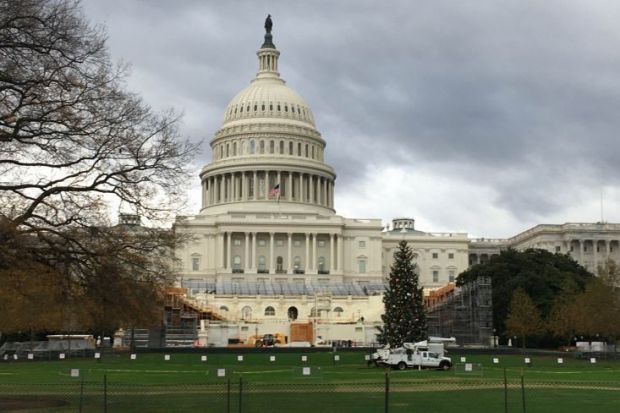The US Congress approved a $1.9 trillion (£1.4 trillion) coronavirus relief bill that includes $40 billion for higher education and provisions to ease student loan forgiveness and further constrain for-profit colleges.
The $40 billion, while far short of what US colleges and universities believe they have lost in the pandemic, more than doubles what the federal government has provided them in two previous relief packages.
It follows weeks of partisan debate stretching over two administrations centring on the role of government in promoting social equity, and comes as US universities are themselves growing more divided between those that badly need the money and those that do not.
As with past Covid relief, the government plans to deliver the funding on an institution-by-institution basis, with the expectation that campuses will allocate half of their share to their students as financial aid.
The plan sets aside larger portions for minority-serving institutions. It does not, however, contain wealth-based limits on institutional eligibility, despite mounting signs that the pandemic has only widened the split between those struggling for enrolment and those enjoying ever greater popularity.
After the first aid package a year ago, then-president Trump made a point of calling out Harvard University as undeserving of the $9 million it was entitled to collect under the bill he signed. Harvard, though, had not asked for the money and was among several that did not take it.
That broadening wealth divide was reflected in a recent report on borrowing across US higher education by Moody’s Investors Service. It described Harvard and Yale universities among institutions that have been taking advantage of low borrowing rates to bolster their coffers, while publics such as Pennsylvania State and Northern Kentucky universities are borrowing to cover pension costs and then hoping the resulting investments don’t fail.
The main US higher education associations reflected that caution and division in welcoming congressional approval of the federal relief package.
“The nearly $40 billion included for students and campuses will be enormously helpful,” said Ted Mitchell, president of the American Council on Education, the central advocacy group. “But this emergency is not over for either higher education or the country as a whole.”
US president Joe Biden had pushed for a bailout measure – one of largest in the world as a share of the national economy – as one of his major campaign promises, and he made plans to promptly sign it into law.
Its higher-education-related provisions also include a five-year exemption from federal taxes of any student loan forgiveness that may be provided. Mr Biden has been under significant pressure from fellow Democrats to use his presidential authority to cancel at least $10,000 per person in existing federal student loan debt, and White House officials have described him as still studying the idea.
The pending new law also will toughen a provision that requires colleges and universities to obtain at least 10 per cent of their revenue from non-federal sources. The change would end a loophole that excludes military benefits from that calculation, thus thwarting many for-profit institutions that match their tuition rates to federal student aid levels, and then market their classes to veterans.
Late adjustments in the bill, however, delayed that change to 2023, and also made students of for-profit schools eligible for relief aid.
Register to continue
Why register?
- Registration is free and only takes a moment
- Once registered, you can read 3 articles a month
- Sign up for our newsletter
Subscribe
Or subscribe for unlimited access to:
- Unlimited access to news, views, insights & reviews
- Digital editions
- Digital access to THE’s university and college rankings analysis
Already registered or a current subscriber? Login








